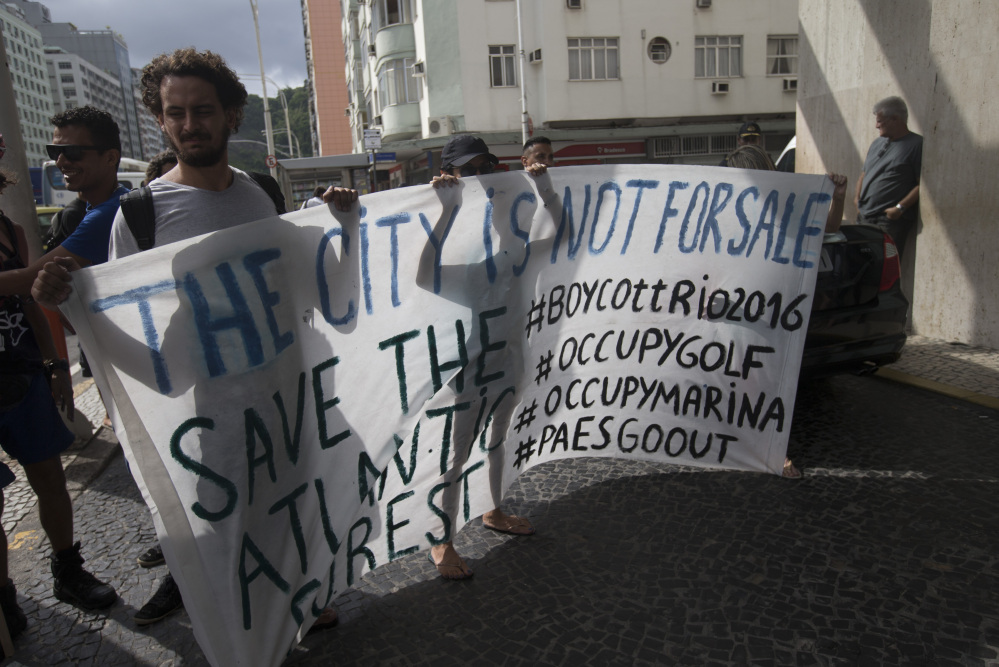RIO DE JANEIRO — Environmental activists burst into the lobby of a luxury hotel on Rio’s Copacabana Beach where IOC officials were meeting Saturday, protesting against ecological destruction related to the 2016 Olympics.
With little progress visible on Olympic promises to clean up the city’s waterways filled with sewage and trash, and the Olympic golf course being carved out of a nature preserve, environmental issues have become a major issue.
A small group of activists managed to steal the spotlight from IOC President Thomas Bach when at least two women pushed their way into the lobby of the hotel where Bach was chairing a meeting of his executive board on another floor.
One of the activists, who grabbed a five-ring Olympic flag and tried to wave it, shouted and blew on a whistle as security guards tried to restrain her. Other protesters outside the hotel held banners, including one saying “Ecological Holocaust. IOC go home.” Another read: “Thomas Bach is a nature killer!”
The chaotic scene was witnessed by about 100 journalists from around the world waiting for the start of a news conference by Bach.
Jean Carlos Novaes, who eventually reached the hotel lobby, said he represented the environmental group “Golf for Whom.” Other protesters said they represented a group called “Occupy Golf,” and “Occupy Marina da Gloria,” the venue for Olympic sailing.
“We are not against the Olympics, but we are against the corruption around the golf course that is being arranged by the mayor (Rio Mayor Eduardo Paes),” Novaes said. “They are stealing with the Olympics as an excuse.”
Paes has been a strong ally of the IOC, and lauded for helping to organize the games. A public prosecutor is also considering a lawsuit against him for granting alleged concessions to the billionaire developer of the golf course, where 140 luxury apartments are being built with prices in the $2-7 million range.
Bach, peppered with questions about the environmental impact on venues, and delays in cleaning up Rio’s waterways, said the games’ overall impact on Rio’s environment would be positive.
“All of this without the games would not have happened,” Bach said. “So, again, it’s clear evidence what a positive legacy these games are leaving in the infrastructure, the social, and in the environmental areas.”
Rio state authorities from the governor to the environment secretary have repeatedly acknowledged they would not be able to make good on the Olympic promise of improving sewage treatment in the communities that ring Guanabara Bay, site of the sailing competitions. But Bach said Brazilian authorities told him the goal would be met.
“Their very clear message was that they are maintaining this target of 80 percent,” Bach said.
Bach declined to speculate about delays in starting the dredging of another polluted waterway that hugs the area near the Olympic Park.
Asked about the construction of the Olympic golf course – the main issue angering Saturday’s protesters – Bach did not address the fact that the course has been carved out of a nature reserve in one of Rio’s fastest-growing neighborhoods.
“We appreciated that the authorities are taking these challenges seriously, and they expressed their commitment to come up with appropriate solutions,” Bach said.
The protesters argued the Olympics will bring environmental destruction, not improvements.
As he was leaving the hotel, Bach briefly stopped to talk with a few protesters but made a few hand gestures indicating he could not hear them.
Mark Adams, the head of communications for the IOC, talked through an interpreter for several minutes with the whistle-blowing protester, who identified herself only as Sandra. She said she was a teacher.
“We’re not against the Olympic Games,” she repeated. “This is about the golf course. We have two golf courses. We don’t need a third.”
Adams offered to be in contact with her, and added in the news conference that the activists were invited to send an email explaining their complaints.
Rio is spending about $14 billion for the Olympics. Brazil spent $12 billion on last year’s World Cup, expenditures that loom larger as Brazil teeters on the brink of recession.
Send questions/comments to the editors.



Success. Please wait for the page to reload. If the page does not reload within 5 seconds, please refresh the page.
Enter your email and password to access comments.
Hi, to comment on stories you must . This profile is in addition to your subscription and website login.
Already have a commenting profile? .
Invalid username/password.
Please check your email to confirm and complete your registration.
Only subscribers are eligible to post comments. Please subscribe or login first for digital access. Here’s why.
Use the form below to reset your password. When you've submitted your account email, we will send an email with a reset code.